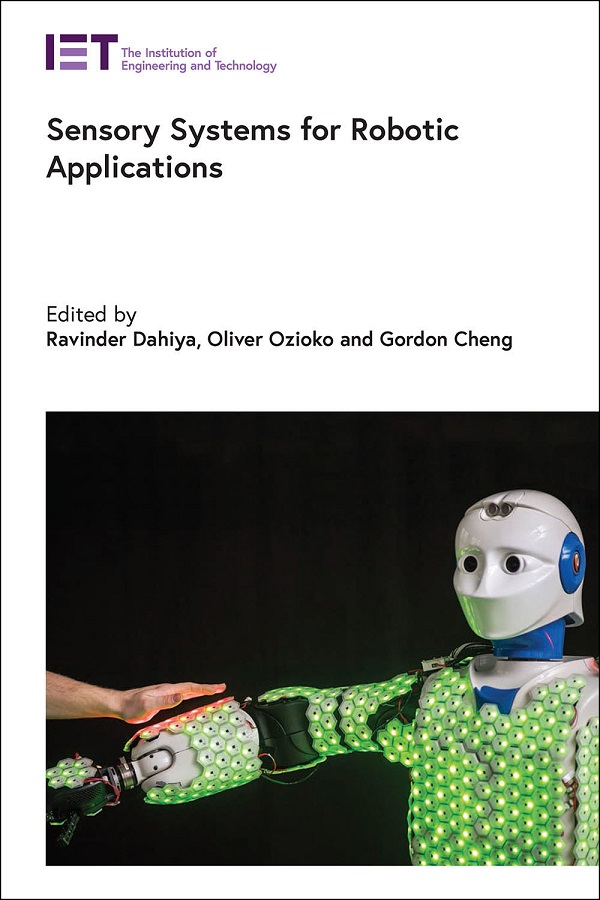- Agricultural Engineering and Technology
- Applied Physics
- Built Environment
- Computing and Networks
- Control, Robotics and Sensors
- Electrical Regulations
- Electromagnetics and Radar
- Energy Engineering
- Healthcare Technologies
- History and Management of Technology
- IET Codes and Guidance
- Manufacturing
- Materials, Circuits and Devices
- Model Forms
- Security
- Telecommunications
- Transportation

Sensory Systems for Robotic Applications
Edited by Ravinder Dahiya, Oliver Ozioko, Gordon Cheng
Robots have come a long way thanks to advances in sensing and computer vision technologies and can be found today in healthcare, medicine and industry. Researchers have been looking at providing them with senses such as the ability to see, smell, hear and perceive touch in order to mimic and interact with humans and their surrounding environments.
Topics covered in this edited book include various types of sensors used in robotics, sensing schemes (e-skin, tactile skin, e-nose, neuromorphic vision and touch), sensing technologies and their applications including healthcare, prosthetics, robotics and wearables.
This book will appeal to researchers, scientists, engineers, and graduate and advanced students working in robotics, sensor technologies and electronics, and their applications in robotics, haptics, prosthetics, wearable and interactive systems, cognitive engineering, neuro-engineering, computational neuroscience, medicine and healthcare technologies.
About the Editors
Ravinder Dahiya is Professor in Electrical and Computer Engineering Department at Northeastern University, Boston, USA. His group (Bendable Electronics and Sustainable Technologies (BEST)) conducts fundamental research in electronic skin, flexible printed electronics and their applications in robotics, prosthetics, wearables, augmented/virtual reality and similar interactive systems. He has authored or co-authored more than 500 publications, books and submitted/granted patents and disclosures. He has led or contributed to many international projects. Prof. Dahiya is President of IEEE Sensors Council. He is the Founding Editor-in-Chief of IEEE Journal on Flexible Electronics (J-FLEX). He has been recipient of EPSRC Fellowship, Marie Curie Fellowship and Japanese Monbusho Fellowship. He has received several awards, including Technical Achievement award from IEEE Sensors Council, Young Investigator Award from Elsevier, and 12 best journal/conference paper awards as author/co-author. He is Fellow of IEEE and the Royal Society of Edinburgh.
Oliver Ozioko is a lecturer in electrical and electronic engineering at the University of Derby, UK. Prior to joining the University of Derby, he worked as a postdoctoral researcher at the University of Glasgow. He holds a PhD Degree in Electrical and Electronic Engineering from the University of Glasgow. His research focuses on sensors and intelligent systems, electronic skin, haptics, assistive technologies, smart systems, as well as self-powered wearable and portable systems. He has authored or co-authored over 29 technical publications. He is the 2023 YP chair for IEEE Sensors council.
Gordon Cheng is chair professor and director of the Institute for Cognitive Systems and is the coordinator of the Center of Competence Neuro-Engineering, Technical University of Munich, Germany. He is also the founding director of the Elite Master of Science program in Neuroengineering (MSNE) of the Elite Network of Bavaria, Germany. For more than 20 years, he has made pioneering contributions in humanoid robotics, neuroengineering and artificial intelligence. He founded the department of humanoid robotics and computational neuroscience at the Institute for Advanced Telecommunications Research in Kyoto, Japan, where he was department head from 2003 to 2008. In addition, from 2007 to 2008 he was a project manager at the National Institute of Information and Communications Technology, Japan, and the Japanese Science and Technology Agency, where he was responsible for the Computational Brain project (2004-2008). He is the co-inventor of 20 patents and co-authored over 350 technical publications. He was acknowledged as an IEEE Fellow in 2017 for his "contributions in humanoid robotic systems and neurorobotics". He holds a Doctorate Degree in Systems Engineering from The Australian National University.
Publication Year: 2022
Pages: 330
ISBN-13: 978-1-84919-948-3
Format: HBK
